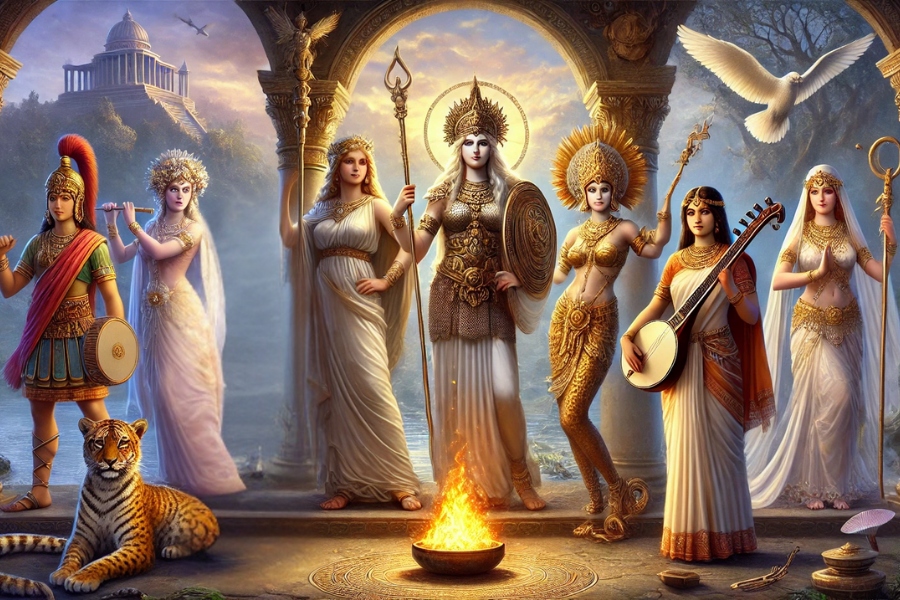Many people struggle to find inspiration in their lives. Ancient mythology introduced powerful goddesses of knowledge to guide us.
This blog will explore these divine figures across different cultures and how they still influence us today.
Get ready to be inspired!
Goddesses of Knowledge Across Cultures
Goddesses of knowledge, such as Saraswati in Hindu mythology, Athena in Greek mythology, Minerva in Roman mythology, Brigid in Celtic mythology, Frigg in Norse mythology, and the Corn Mother in Native American mythology, have been revered across various cultures.
Each deity embodies different aspects of wisdom and learning within their respective mythologies.
Hindu mythology (Saraswati)
Saraswati, a prominent deity in Hindu mythology, embodies wisdom, knowledge, and the arts. Worshippers honor her as the goddess of learning, music, language, and all forms of artistry.
This divine figure is usually depicted with four arms that symbolize different aspects of intellectual pursuits: mind, intellect, alertness, and ego. Each arm holds an item with deep symbolic meaning— a book representing knowledge; a rosary symbolizing meditation and spirituality; a water pot embodying purification; and a musical instrument (veena) indicating creativity.
Her presence marks the importance of education in human civilization according to ancient texts. Devotees celebrate Saraswati Puja with great fervor in schools and educational institutions across India to seek her blessings for enlightenment and success in their studies.
The festival highlights society’s respect for education underlining the belief that knowledge is pivotal for personal development and collective advancement.
Roman mythology (Minerva)
In Roman mythology, Minerva is regarded as the goddess of wisdom, strategy, and skill. She is associated with knowledge and learning, often depicted with symbols of wisdom such as books, scrolls, and writing tools.
As a powerful and wise deity in Roman culture, Minerva also embodied qualities of courage and strategic warfare prowess. Additionally recognized as the protectress of various aspects including art, trade, science, warcraft tactics among others within Roman society; her influence was pervasive across many realms.
Minerva held great significance in ancient Rome as one who harnessed divine wisdom. She was celebrated through various festivals and temples dedicated to her honor throughout the Empire.
Celtic mythology (Brigid)
In Celtic mythology, Brigid, the goddess of knowledge and wisdom, was highly revered for her connection to poetry, healing, and craftsmanship. She was also associated with the arrival of spring and fertility.
Brigid’s influence extended across various aspects such as smithcraft and the hearth. As a patroness of learning and creativity, she symbolized inspiration and the spark of divine knowledge.
Moving ahead to Greek mythology (Athena), let’s explore another fascinating aspect of ancient deities associated with knowledge.
Greek mythology (Athena)
In Greek mythology, Athena is renowned as the goddess of wisdom and warfare. She boldly emerged from the head of her father, Zeus, fully grown and armored. Often depicted with a helmet and shield, she exemplifies strategic warfare and intelligence in battle.
Associated with philosophy, handicrafts, and weaving in addition to war strategy, Athena’s vast knowledge encompasses various areas of expertise. Her guidance was sought for advice in times of crisis or indecision.
Athena continues to be an influential figure today through numerous cultural references reaffirming her status as a symbol of wisdom and empowerment. (source: judithlaura.com)
Norse mythology (Frigg)
Frigg, a key figure in Norse mythology, is revered as their deity of knowledge and wisdom. She holds immense significance in the ancient Norse culture as the wife of Odin, the chief god.
Frigg is associated with foresight and is often depicted as a powerful and wise figure within her realm. Her role as a deity of knowledge aligns with her representation as a protective mother and nurturer, making her an essential aspect of Norse mythology’s rich tapestry.
In depicting Frigg’s characteristic connection to knowledge, it becomes evident that she embodies profound wisdom integral to the collective consciousness of Nordic belief systems.
Common Traits and Symbols of Goddesses of Knowledge
Goddesses of knowledge are often associated with wisdom and learning, portraying powerful and wise figures in their respective cultures. They are frequently depicted with books, scrolls, or writing tools that symbolize their connection to mythological knowledge.
Associated with wisdom and learning
These divinities of knowledge from ancient mythology are deeply associated with wisdom and learning. They hold immense significance in various cultures, depicted as powerful and wise figures.
These deities often carry symbols like books, scrolls, or writing tools that represent their association with knowledge and wisdom. In Hindu mythology, Saraswati embodies the essence of creativity, eloquence, and education while Athena in Greek mythology is revered for her strategic skill in warfare and handicrafts.
Associated with female deities in many ancient mythologies, these divine figures of knowledge have left an indelible mark on the religious and mythological landscape across cultures. Their portrayal as knowledgeable beings further reinforces their strong connection with wisdom and learning throughout history.
Often depicted with books, scrolls, or writing tools
Goddesses of knowledge from various ancient mythologies are often depicted with books, scrolls, or writing tools. This symbolizes their association with wisdom and learning in their respective cultures.
These powerful and wise female figures are represented as guardians and promoters of knowledge, inspiring people to pursue education and seek enlightenment through the written word.
The portrayal of deities with these symbols emphasizes the importance of literacy, scholarship, and the preservation of knowledge across different ancient societies.
In addition to being associated with wisdom and learning, goddesses depicted with books, scrolls, or writing tools serve as a reminder of the significance of intellectual pursuits in human history.
Their representation underscores the role of women in preserving cultural heritage through literature and documentation. Furthermore, it highlights the timeless value placed on written communication as a means to disseminate knowledge across generations.
Represented as powerful and wise figures in their respective cultures
Goddesses of knowledge, such as Saraswati in Hindu mythology, Athena in Greek mythology, Minerva in Roman mythology, Brigid in Celtic mythology, Frigg in Norse mythology, and Corn Mother in Native American mythology are revered as powerful and wise figures.
These deities are associated with wisdom and learning across various cultures. They are often depicted holding books, scrolls, or writing tools symbolizing their role as patrons of knowledge.
The depictions of these holy characters underline their significance within their respective cultures. They serve as sources of inspiration for seekers of knowledge and embody the ideals of intelligence and wisdom that continue to resonate through the ages.
Conclusion
The Goddesses of Knowledge from ancient mythology are revered in different cultures.
They are associated with wisdom and learning, depicted as powerful figures with books or writing tools.
Each goddess exemplifies unique qualities within their respective cultures, showcasing the diversity and richness of ancient deities. Their influence on knowledge and education is profound across various mythologies, leaving a lasting legacy for generations to come.





